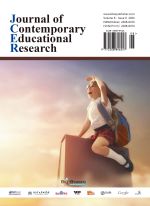Abstract
The purpose of this study is to determine the teacher’s perceptions of the challenges and strategies in supporting students with reading difficulties. This study used qualitative method of research and descriptive approach as its research design, in addition to a set of structured interview questions administered through Google Forms to gather data from elementary teachers of Taal Central School, located at Taal Batangas. These structured interview questions were carefully designed to cover various dimensions of the study, including the types of challenges perceived by teachers, strategies employed, and possible solutions for addressing the problems encountered in the process of supporting students with reading difficulties. The results revealed that teachers faced several challenges when teaching students with reading difficulties such as emotional and motivational issues/factors, lack of resources or teaching aids, deficits in knowledge and skills, and problems with student engagement and participation. This study also showed common approaches utilized by the teachers in supporting students with reading difficulties, which were fostering a positive and supportive environment, adopting individualized and multifaceted approaches, and utilizing effective teaching tools and strategies. Lastly, teachers also concluded varied solutions in addressing the challenges perceived in teaching students with reading difficulties towards fostering reading proficiency. These include developing peer support, use of positive reinforcement, and parental involvement. Moreover, specialized resources, professional development for teachers, and specific teaching strategies are also highlighted as crucial components. By integrating these approaches, teachers concluded that it can create a supportive and effective learning environment tailored to the needs of students with reading difficulties.
References
Hussin AA, 2018, Education 4.0 Made Simple: Ideas for Teaching. International Journal of Education and Literacy Studies, (6): 92–98.
Moats L, 2020, Teaching Reading “Is” Rocket Science: What Expert Teachers of Reading Should Know and Be Able to Do. American Educator, 44(2): 4.
OECD, 2019, PISA 2018 Assessment and Analytical Framework, viewed July 2, 2024, https://doi.org/10.1787/b25efab8-en
OECD, 2019, PISA 2018 Results (Volume I): What Students Know and Can Do, viewed July 2, 2024, https://doi.org/10.1787/5f07c754-en
Darling-Hammond L, 2000, Teacher Quality and Student Achievement: A Review of State Policy Evidence. Education Policy Analysis Archives, 8(1): 1–44. https://doi.org/10.14507/epaa.v8n1.2000
Murunwa D, 2022, Foundation Phase Teachers’ Challenges in Teaching Reading in South Africa. South African Journal of Education, 42(suppl 1): 2219.
Küçükler H, Kodal A, 2019, Foreign Language Teaching in Over-Crowded Classes. English Language Teaching, 12(1): 169–175.
Matsepe D, Maluleke M, Cross M, 2019, Re-Imagining Teacher’s Experience with Overcrowded Classrooms in the Public Secondary Schools in South Africa. Journal of Gender, Information and Development in Africa, 8(2): 91–103.
Kalitanyi V, Visser K, 2010, African Immigrants in South Africa: Job Takers or Job Creators? South African Journal of Economic and Management Sciences, 13(4): 376–390.
Marais AM, Wessels E, 2020, Investigating the Interpretation and Implementation of Policies that Guide the Teaching of Reading in the Foundation Phase. Reading & Writing, 11(1): a277.
Mojapelo MS, Dube L, 2014, Information Access in High School Libraries in Limpopo Province, South Africa. South African Journal of Libraries and Information Science, 80(2): 8–16.
Clement S, Kent K, Duursma E, 2021, Literacy Beyond the Home and the Classroom: Public Environmental Print and Children’s Literacy. Children’s Geographies, 19(1): 37–44.
De Witt M, Lessing A, 2016, The Influence of a School Readiness Program on the Language and Phonological Awareness Skills of Preschool Children in Rural Areas of South Africa. Australasian Journal of Early Childhood, 41(1): 106–114.
Department of Basic Education, 2014, National Curriculum Statement, Government Publications, Pretoria, South Africa.
Rule P, Land S, 2017, Finding the Plot in South African Reading Education. Reading & Writing, 8(1): a121.
Wessels M, 2010, Practical Guide to Facilitating Language Learning (3rd ed), Oxford University Press Southern Africa, Cape Town, South Africa.
Adamu A, Tsiga AU, Zuilkowski SS, 2022, Teaching Reading in Northern Nigeria: The Challenges of Large Class Size. Pedagogy, Culture & Society, 30(2): 225–242.
Antoni J, 2014, The Practice of English Language Teaching, 4th edn, Pearson Education Ltd, London.
Purwanto T, 2022, Teaching and Learning in the Language Classroom, Oxford University Press, Oxford.
Vacca L, Vacca K, 2019, Research Methods in Education 5, Routledge, London.
Sari GR, Santihastuti A, Wahjuningsih E, 2020, Students Perception on Reading Comprehension Problems in Narrative Text. LLT Journal: A Journal on Language and Language Teaching, 23(2): 342353.
Sadjati IM, 2012, Modul Pengembangan Bahan Ajar, Hakikat Bahan Ajar, Universitas Terbuka, Jakarta, 1–62
Suwarni AJ, Lindberg E, Nilsson C, et al., 2015, Qualitative Thematic Analysis Based on Descriptive Phenomenology. Nursing Open, 6(3): 733–739.
Muammar, 2020, Membaca Permulaan di Sekolah Dasar, Sanabil, Mataram.
Darmansyah, 2012, Konsep Dasar Strategi Pembelajaran, Bahan Ajar Strategi Pembelajaran.
Klein DC, Peterson SA, Simington R, 2014, The Effectiveness of Strategic Reading Instruction for College Development Readers. Journal of College Reading and Learning, 35(1): 25–49.
Hayes M, 2019, Whatever Happened to Curriculum Theory? Critical Realism and Curriculum Change, Pedagogy. Culture and Society, 19(2): 221–238.
Rumelhart DR, 2018, The Essentials of Teaching Children to Read: What Every Teacher Should Know, 3rd edn, Pearson Education, Boston, MA.
Rand C, 2014, Approaches and Methods in Language Teaching, Cambridge University Press, Cambridge.
Pearson M, McNamara DS, Wiley J, et al., 2019, From Guided Comprehension: A Teaching Model for Grades 3–8, International Reading Association, US.
Burns SW, Ross JT, Roes D, 2019, Research Methods for Everyday Life: Blending Qualitative and Quantitative Approaches, Jossey-Bass, San Francisco.
Goodman KS, 2013, The Reading Process, in Carrell PL, Devine J, Eskey DE, (eds.), Interactive Approaches to Second Language Reading, Cambridge University Press, Cambridge, 11–21.
Smith F, 2013, How Important is Reading Skill Fluency for Comprehension? Reading Teacher, 60(6): 560–569.
Main P, 2023, Theories of Reading, viewed July 3, 2024, https://www.structural-learning.com/post/theories-of-reading
McCombes DS, 2019, Reading Comprehension Strategies: Theories, Interventions, and Technologies, Lawrence Erlbaum Associates, New York.
Colaizzi PF, 1978, Psychological Research as the Phenomenologist Views It, in Valle R, King M, (eds.), Existential Phenomenological Alternatives in Psychology, Oxford University Press, Oxford, 48–71.
